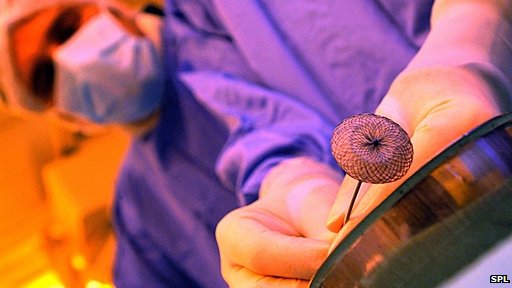
A medical superglue has been developed that has the potential to patch heart defects on the operating table or stop bleeding on the battlefield.
The new adhesive may eventually replace stitches and staples in heart, gut and blood vessel surgery, says a US team.
Tests on pigs show it can seal cardiac defects in seconds and withstand the forces inside the heart.
The glue, inspired by the sticking abilities of slugs, could be available for human use in two years.
Skin glue is a special type of medical adhesive used to join the edges of a wound together, while the wound starts to heal.
Medics may use skin glue to close wounds, instead of other methods such as stitches or staples.
However, until now medical glue has not proved strong enough to withstand the forces inside the pumping chambers of the heart or major blood vessels.
Inspired by slugs
The new glue, developed by Harvard Medical School, can provide a waterproof seal that is bonded in a few seconds with a shine of UV light.
Study co-author Prof Jeffrey Karp, of Brigham and Women’s Hospital in Boston, Massachusetts, told. “We have developed a surgical glue that can be used in open and more invasive procedures and seal dynamic tissues such as blood vessels and the heart, as well as the intestines.
“We think that our glue could augment stitches or staples or possibly replace them.
“More importantly, this should open the door to a greater adaptation of minimally invasive procedures.”
The polymer adhesive, which is both blood and water repellent, is inspired by the ability of animals, such as slugs, to cling to surfaces using sticky secretions that work in the wet.
The researchers tested the glue on the hearts of pigs, which resemble human hearts, during surgery, and found that it could effectively repair heart defects in the animals.
They say further studies testing the safety of the glue in humans are needed, but the results suggest the new surgical glue could be used for sealing open wounds quickly in trauma.
Prof Karp said he expected the glue to be available in two to three years, after undergoing human testing.
Dr Sanjay Thakrar from the British Heart Foundation said: “The cardiovascular system is a dynamic environment where there is continuous blood flow and tissue contractions and existing glues often don’t work well in these conditions.
“These researchers seem to have found an innovative way to overcome these issues, which could be especially useful during minimally invasive procedures.”
“As the scientists only measured the effectiveness of the glue over a short time period, it is important to see how the glue performs for longer durations.”
The research is published in the journal Science Translational Medicine
Source: BBC news


